- Home
- Hannah West
The Bitterwine Oath
The Bitterwine Oath Read online
Contents
Cover
Title Page
Copyright
Dedication
One
Two
Three
Excerpt
Four
Five
Excerpt
Six
Seven
Excerpt
Eight
Nine
Excerpt
Ten
Excerpt
Eleven
Twelve
Thirteen
Fourteen
Fifteen
Sixteen
Seventeen
Eighteen
Nineteen
Twenty
Twenty-One
Twenty-Two
Twenty-Three
Twenty-Four
Twenty-Five
Twenty-Six
Twenty-Seven
Excerpt
Twenty-Eight
Twenty-Nine
Thirty
Thirty-One
Thirty-Two
Thirty-Three
Epilogue
Acknowledgments
Copyright © 2020 by Hannah West
All Rights Reserved
HOLIDAY HOUSE is registered in the U.S. Patent and Trademark Office.
Printed and bound in October 2020 at Maple Press, York, PA, USA.
www.holidayhouse.com
First Edition
1 3 5 7 9 10 8 6 4 2
Library of Congress Cataloging-in-Publication Data
Names: West, Hannah, author.
Title: The bitterwine oath / by Hannah West.
Description: First edition. | New York : Holiday House, 2020. | Audience: Ages 14–up. Audience: Grades 10–12. | Summary: Can eighteen-year-old Natalie and her
great-great-grandmother’s magical sisterhood end the cycle of violence in
Natalie’s small Texas town?
Identifiers: LCCN 2019055102 | ISBN 9780823445479 (hardcover)
Subjects: CYAC: Magic—Fiction. | Witchcraft—Fiction. Supernatural—Fiction. | Texas—Fiction.
Classification: LCC PZ7.1.W4368 Bi 2020 | DDC [Fic]—dc23
LC record available at https://lccn.loc.gov/2019055102
ISBN: 978-0-8234-4547-9 (hardcover)
For everyone who feels at home in the spooky woods, the dusty library, and all other places where magic seems most likely to show itself
Lillian Pickard
I did not regret befriending Malachi Rivers until the night we invoked her magic to seek revenge.
Four of us sat in a circle on the floor of an abandoned cabin in the Piney Woods, twine looped around our girlish wrists, binding us together. A grimoire lay open upon tender sprigs of herbs and bones of woodland creatures. Segments of text had been violently crossed out and revisions crammed into the margins.
Malachi Rivers was indeed that powerful; her edits and improvisations increased the potency of every charm, hex, curse, and conjuration.
Until that fateful night in the summer of 1921, our foursome, led by Malachi, had performed harmless magic for entertainment and empowerment. Dorothy Hawkins, Johanna Mead, and I revered Malachi’s magic and wanted to participate. While we were bound together, we could channel it. The powerless could become powerful.
We called ourselves “Pagans of the Pines” in a spirit of cheeky rebellion. The magic had been a girlhood game to me, the grimoire nothing more than a mass-produced, curious collectible pilfered from the parlor of my cosmopolitan aunt.
But everything changed that night. Childish rebellion turned to sinister retribution.
Dorothy, Johanna, and Malachi had endured trials I could not fathom. Malachi’s father was controlling and oppressive. Johanna Mead’s abusive father and uncle had beaten the boy she loved nearly to death out of a twisted sense of protectiveness. A lynch mob had murdered Dorothy Hawkins’s older brother over a false accusation that he had attempted to murder a white man. Her sharecropper father had lost his land, and the family relied on charity from their church to scrape by.
Now that Malachi had nearly mastered her magic of earth, bone, and blood, the three of them wanted to claim vengeance commensurate to their suffering.
We did not mean to kill. Malachi concocted a curse that would reveal the deep evil within the hearts of the men who had wronged them, so that society would no longer accept, respect, or enable their dark deeds. Malachi had spoken the curse over the Communion wine in the sanctuary of her father’s church. We watched her, witnessed her slender body rocking with power, her wrists and hands trembling. She dusted the wine with herbs, dipped her fingers into the chalice, and painted her mark on the white cloth of the Communion table—the mark we had created to represent the three elements from which she drew her power.
“The Devil’s supper,” I recall her whispering in the candlelight.
We returned to our consecrated ground—the cabin nestled in a forgotten forest glade—to finish our work. We would use magic to lure the men to Communion at the witching hour. They would drink the cursed wine, and their darkness would be known to all.
But as soon as we split the flesh of our fingertips and dripped blood over our preparations, I felt Malachi’s magic spinning out of control, like a toy top whirling fast enough to lift off the ground and bounce about unpredictably. The other girls’ anger fueled it, giving it a will of its own.
I was afraid. I wanted to stop it. But our hands were already bound, and to break the bond before our work was complete would be far more dangerous than even the darkest conjuration.
I have undoubtedly lost many a reader already with my earnest talk of magic. But I have no other pen with which to write this biography.
Any tale about Malachi that excludes magic is not about Malachi
at all.
Excerpt from Pagans of the Pines: The Untold Story of Malachi Rivers, published 1968
ONE
Natalie Colter
— PRESENT DAY —
ONE MONTH AND TEN DAYS UNTIL THE CLAIMING
The first day of my last summer in San Solano was clammier than a fever. The sun baked the mud from last night’s storm like clay in a kiln as my best friend and I ran the trail we’d forged between our two houses.
“You’re falling behind, regional champ!” Lindsey Valenzuela taunted over her shoulder.
Ambition gnawed at my tired muscles and I pushed myself harder. In a few short months, I’d be a college freshman distance runner with everything to prove. I couldn’t afford a lethargic summer.
My toe caught on a divot in the rough terrain and I fell, earning stinging scrapes along my palms and elbows.
Lindsey doubled back to offer me a hand, her shadow stretching over me. “You okay?”
I accepted the help and unstuck my sweaty tank top from my skin. “No offense, but when did you get faster than me?”
“It’s my green juice.” She slapped her bicep, way too perky for having just covered three miles in the heat. “You should try it.”
“No way. It smells like toxic waste.”
“Your call.” Lindsey swiped caramel-highlighted dark hairs from her dewy face and grinned. “I’ll just keep handing you your ass.”
As I brushed dirt off my legs, a lazy wind carried perfume from clusters of pale honeysuckles, and with it, a stench of rot. I wrinkled my nose and palmed sweat from my eyes, searching the overgrown grasses. Behind a barbed-wire fence marking private pastureland, I found a bovine ribcage the size of a barrel. Scavengers had ripped away most of the meat, but flaps of decaying flesh remained.
“Gross,” Lindsey said, following my look of disgust.
Like every other East Texas town, San Solano was hotter than the Devil’s crack by the end of May, and th
e carcass reeked. But I ventured a step into chigger-ridden grasses to get a closer look.
“Nat, don’t get too close!” Lindsey said.
“There’s no head.” I was almost relieved by the lack of a bulging tongue and hollow eye sockets. “Isn’t that weird?”
“It’s probably mounted in a steakhouse.”
“That’s an Angus farm,” I said, pointing. “Why would anyone mount a cow with no horns?”
I expected to see my curiosity mirrored in her molasses-brown eyes. But she shrugged and flicked a mosquito from her patterned neon running shorts. “You’re the one whose dad’s a vet. I don’t know anything about cows.” She caught up to my insinuation and flashed me a sideways look of suspicion. “You’d better not be getting superstitious on me.”
Retying my dirty-blond hair in a ponytail, I crossed back through the patches of Indian paintbrush. “I’m not saying I think the Malachians are still around or anything.”
“Good.”
“But don’t you think it’s a little unsettling?”
“It’s just a dead cow!” Lindsey cried. “This town is on the verge of hysteria.”
An overstatement, but San Solano was undeniably on edge. The sheriff’s department had sent deputies to our classes the week before finals to hook their thumbs in their belts and lecture us against getting too rowdy this summer. “Stay away from Calvary Baptist unless you’re attending a service,” they’d warned, “and don’t stir up trouble at the cabin in the woods. No trespassing means no trespassing.”
They asked us to inform them of anything “unusual.” We knew what they meant: books of curses, assortments of herbs and animal bones, or the symbol that had become shorthand for cult activity in San Solano.
But they warned us not to panic if we saw something suspicious. The most likely culprits would be local teens like us pulling pranks, or tourists who were overly fascinated with the town’s violent past. Plenty of their kind would descend on San Solano in the coming days.
Maybe the police would succeed in discouraging the late-night dares and the rumors threatening to whip the town into a frenzy. But nothing would stop the curious gazes that burned the back of my neck. Nothing would stop the calls from journalists that made my mom unplug our outdated landline and forced my dad to add “veterinary business only” to his contact page.
As the only living descendants of Malachi Rivers, we were the hot ticket in town this summer.
“The twins want to meet us at Sawmill,” Lindsey said, checking her phone. “Can we detour? I’m hungry.”
I glanced back at the headless carcass, wondering how Lindsey could summon an appetite right now. But I decided to drop it. I could picture the sheriff teasing me for calling to report dead livestock in a pasture. He’d been my dad’s best friend since their middle school days.
We hit the trail again. I couldn’t shake the sense that Lindsey was pacing herself to avoid leaving me in the dust. A healthy sense of competition had been the foundation of our friendship ever since we’d borrowed our teacher’s stopwatch to race across the monkey bars during third-grade recess.
I wanted to snap at her for going easy on me. I was too fast for her to go easy on me.
She was barely panting by the time we stepped off the trail into an overgrown meadow and crossed the country highway to Sawmill, our town’s famously ramshackle barbecue joint.
The Dixon twins waited for us at a picnic table outside. The hot metal bench burned my bare thighs as I plopped down next to Abbie with my sweet tea and pulled pork sandwich. She smelled like freshly applied sunscreen, but her round, ivory face seemed to only get pinker as the sun bore down on us.
“Y’all want to do a group trip to Toledo Bend after church this Sunday?” her sister Faith asked, bending the brim of her ball cap to shade her equally sensitive face. Her button nose was still peeling from the last sunburn. “Or will you be too busy training like overachieving dorks?”
“Y’all are begging to get massacred out on those trails,” Abbie added before either of us could answer.
“Technically that would be murder, not a massacre,” I pointed out. “And we’re not boys, so we’re safe. Which is pretty ironic.”
“Come on, people!” Lindsey smacked her palm on the table, rattling the condiments. “No one could ever prove that Malachi and her friends killed those dudes, and even the copycat murderers would be old by now, if they’re still alive. Nothing is going to happen.”
She was right about the first two things, and probably right about the third. Malachi Rivers and three other girls had faced trial for fatally poisoning a dozen men—including Malachi’s father—with Communion wine in a church sanctuary in July of 1921. The motive was there, but the conclusive evidence was not. Though the men had clearly partaken of the wine just before they died, the police found that it didn’t contain any identifiable toxic substances. The girls were acquitted.
Malachi had been the leader of the group, and thus the unanswered questions had circled back to her. She’d tried to make a normal life for herself after the trial, but she disappeared permanently just a handful of years later, leaving a husband and young son—my great grandfather—without a word.
And then a second massacre happened exactly fifty years after the first.
The twelve victims were, once again, all male. Unlike the first time, they were mostly young, in their teens and twenties, and hadn’t committed any heinous offenses, as far as anyone knew. And unlike the first time, there was evidence of a struggle in the sanctuary: bruises and lacerations on the victims’ wrists suggesting they’d been held against their will, several broken bones between them, plus destruction of church property. The actual cause of the deaths was still unknown; forensic testing proved beyond a doubt the wine contained nothing but harmless herbs.
The cases were more like kissing cousins than identical twins. Due to the discrepancies, investigators labeled the second massacre a copycat crime. And even though Malachi had been legally declared innocent, it was clear the copycats had been inspired by the rumors of her magic. Thus, the investigators lumped the events together and dubbed them the “Malachian Massacres.” Both remained unsolved.
And now, the semicentennial anniversary of the massacres was creeping closer.
The town’s unspoken questions had been like keepsakes tucked away in the attic. Did Malachi and her three friends have something to do with the deaths of the men who had traumatized them in 1921? Who had mimicked the massacre in 1971?
And most importantly, were the fanatics out there today? Would the people who revered Malachi’s legacy strike again?
As if reading my thoughts, Abbie spoke up in a voice that would have paired well with a flashlight and a campfire. “Maybe the Malachians have been recruiting in secret this whole time. Maybe someone we know is one of them. It’s kind of interesting to imagine—”
“Interesting?” Lindsey cut her off, instantly serious. “Real people died, Abbie.”
“I know that, Lindsey,” Abbie retorted. She rolled her blue eyes and jabbed at her potato salad. “Our great-great uncle died in the first massacre. He was a jerk and he deserved it, but it’s not a joke to me.”
The glare in Lindsey’s chocolate-brown eyes melted away. “Anyway, Nat would know if the Malachians were still active.”
“How would I know?” I asked, devouring a bite of my messy sandwich. I’d always been interested in the massacres from a historical standpoint, but I wasn’t obsessed or anything.
“Because they would try to recruit you,” Lindsey explained, as though it were obvious. “They believed Malachi Rivers could do magic, and you’re related to her. Has anyone ever tried to drag you out to the woods for a creepy ritual or anything?”
“No.”
“Then the cult is dead,” Lindsey declared. She arched her dark brows at Abbie and slurped the last of her Dr Pepper.
“All the more reason to have some fun,” Abbie said. “We know we’re not in any real danger.”
&nb
sp; Faith had been studying her split ends, but she flicked her ash-brown braid over her shoulder and planted her elbows on the table. “Everyone’s talked this topic to death. Are y’all in for the lake trip? With the usual crew?”
“And Levi,” Abbie added. “He’s back in town.”
I’d already spotted the weathered blue pickup in the Langford family’s driveway, but hearing his name made a pang pinch between my ribs.
Lindsey eyed me sidelong as I swilled my tea and crushed ice between my teeth. Only she knew what had happened between Levi and me before he left last August.
He’d been slated to start his freshman year at college in Dallas when his father had died suddenly of an aneurysm. Levi’s mom and sister had hoped he would defer for a semester. But he didn’t. He’d left.
And since finding his letter in my mailbox on the morning he’d driven away, I hadn’t heard from him once.
That letter had been a stoic farewell, its careful words the cool cobalt of distance and forgetting.
“Did you hear Levi got two of his poems published in, like, a prestigious poetry review?” Faith asked. “Mrs. Langford was bragging on him at the potluck last Sunday.”
“Good for him,” Lindsey chirped, saving me from having to reply.
“So are y’all coming?” Faith pressed.
Lindsey fiddled with the fitness watch that left subtle tan lines on her golden-brown wrist, waiting for me to say yes before she accepted the invitation. I could tell Levi’s homecoming had already raised her hackles, but she didn’t need to worry about me wasting any energy on him.
“Yeah, sounds fun,” I said. I only had one summer to soak up time with people I’d miss—people who’d miss me back.
The twins drove me home first, past acres upon acres of pines and meadows. When we jostled over the gravel driveway toward my family’s yellow farmhouse and the guesthouse my dad had converted into a veterinary office, Maverick and Ranger, our cattle dogs, scrambled from the front porch to greet me.
“See you at graduation!” Abbie sang out the window. I waved and scratched the dogs’ mottled gray-and-black coats before checking the mail, finding graduation cards from relatives and a hefty packet of summer training and nutrition tips from my future coach.

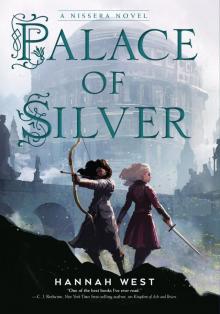 Palace of Silver
Palace of Silver Marked for Love
Marked for Love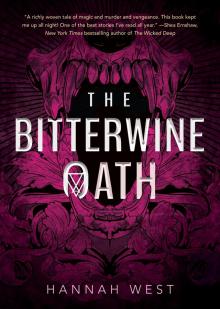 The Bitterwine Oath
The Bitterwine Oath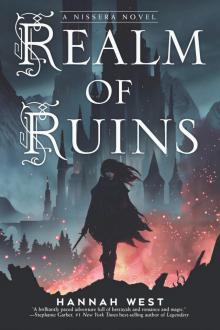 Realm of Ruins
Realm of Ruins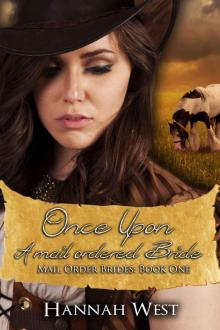 Once Upon a Mail Order Bride: Mail Order Brides: Book One
Once Upon a Mail Order Bride: Mail Order Brides: Book One How to Become a Lady: Book One of the London Ladies Series
How to Become a Lady: Book One of the London Ladies Series Her Northern Warlord: Norman Lords: Book Three
Her Northern Warlord: Norman Lords: Book Three To be a Lady or a Gypsy: Part One: Book Two of the London Ladies Series
To be a Lady or a Gypsy: Part One: Book Two of the London Ladies Series Her Norman Lord: Norman Lords: Book One
Her Norman Lord: Norman Lords: Book One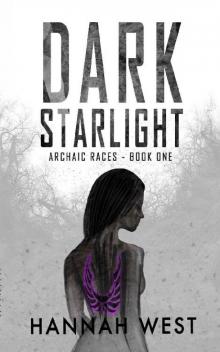 Dark Starlight
Dark Starlight Her Highland Laird: Norman Ladies: Book One
Her Highland Laird: Norman Ladies: Book One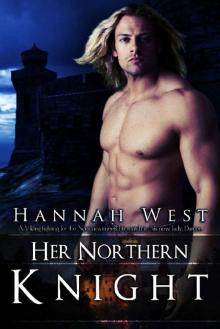 Her Northern Knight: Norman Lords: Book Two
Her Northern Knight: Norman Lords: Book Two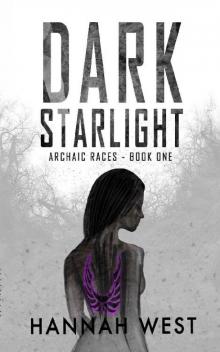 Dark Starlight: Archaic Races Book One
Dark Starlight: Archaic Races Book One